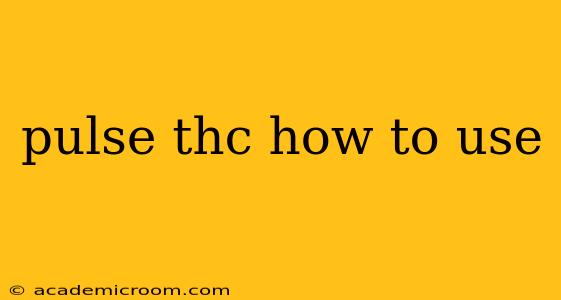Pulse THC, also known as delta-8 THC, is gaining popularity as a milder alternative to traditional delta-9 THC. Unlike delta-9 THC, which is found abundantly in cannabis, delta-8 THC occurs naturally in much smaller amounts. This has led to its production through chemical conversion of CBD. Understanding how to use Pulse THC safely and effectively is crucial for maximizing its potential benefits while minimizing any risks. This guide will delve into various aspects of Pulse THC usage, answering frequently asked questions and providing helpful tips.
What are the different ways to use Pulse THC?
Pulse THC, like other cannabinoids, can be consumed in various ways, each offering a different experience and onset time. The most common methods include:
- Edibles: Pulse THC edibles, such as gummies, brownies, or tinctures, offer a longer-lasting effect but take longer to kick in (30 minutes to 2 hours). This is due to the first-pass metabolism in the liver.
- Vape Pens/Cartridges: Vaping provides a fast-acting and relatively potent method of consumption. The effects are typically felt within minutes and may last for a couple of hours. It's crucial to use high-quality cartridges and reputable brands to ensure purity and safety.
- Tinctures: Sublingual tinctures are absorbed under the tongue, offering a faster onset of effects than edibles but slower than vaping. The absorption through the mucous membranes allows for quicker entry into the bloodstream.
- Topicals: Pulse THC topicals, like creams or lotions, are applied directly to the skin and provide localized relief. They do not produce psychoactive effects due to their inability to cross the blood-brain barrier.
What are the potential benefits of using Pulse THC?
While research on delta-8 THC is still ongoing, many users report experiencing several potential benefits:
- Mild Psychoactive Effects: Delta-8 THC offers a milder high compared to delta-9 THC, making it appealing to those seeking a less intense experience.
- Pain Relief: Some users report finding relief from chronic pain and inflammation.
- Anxiety Relief (in some users): While it can cause anxiety in some, others find it helpful in managing anxiety symptoms. This effect varies greatly between individuals.
- Appetite Stimulation: Similar to delta-9 THC, delta-8 THC may help stimulate appetite.
- Improved Sleep: Some users report improved sleep quality with the use of delta-8 THC.
What are the potential side effects of using Pulse THC?
While generally considered safer than delta-9 THC, Pulse THC can still produce side effects, including:
- Dry Mouth: This is a common side effect of cannabinoid use.
- Dry Eyes: Similar to dry mouth, this is a frequent experience.
- Dizziness: Some users experience dizziness, particularly at higher doses.
- Anxiety or Paranoia: Although less common than with delta-9 THC, it can still occur, especially in those sensitive to cannabinoids.
- Changes in Appetite and Sleep: These are often dose-dependent.
How much Pulse THC should I use?
Starting with a low dose is crucial. Begin with a small amount, wait at least an hour to feel the effects, and then adjust the dose as needed. Tolerance can build, so it's vital to monitor your intake and avoid overconsumption. The ideal dosage varies significantly depending on individual factors such as body weight, metabolism, and tolerance. Always follow product instructions for recommended dosage and consult with a healthcare professional if you have any concerns.
Is Pulse THC legal?
The legal status of Pulse THC is complex and varies by location. Check your local and state laws before purchasing or using any Pulse THC products. The legal landscape is constantly evolving, so staying informed is important.
How does Pulse THC compare to delta-9 THC?
Delta-8 THC is often described as having a milder psychoactive effect than delta-9 THC. It's believed to bind to the CB1 receptors in the brain differently, resulting in a less intense high. However, individual responses can vary. Both cannabinoids may offer similar therapeutic benefits, but more research is needed to fully understand the differences in their effects.
Is Pulse THC safe?
While generally considered safer than delta-9 THC, it’s essential to obtain Pulse THC products from reputable sources that provide third-party lab testing results verifying purity and potency. This ensures that the product is free of contaminants and that the dosage is accurate. It's always recommended to start with a low dose and gradually increase it as needed while observing your body's reaction.
This information is intended for educational purposes only and does not constitute medical advice. Always consult with a healthcare professional before using Pulse THC, especially if you have pre-existing health conditions or are taking other medications.
